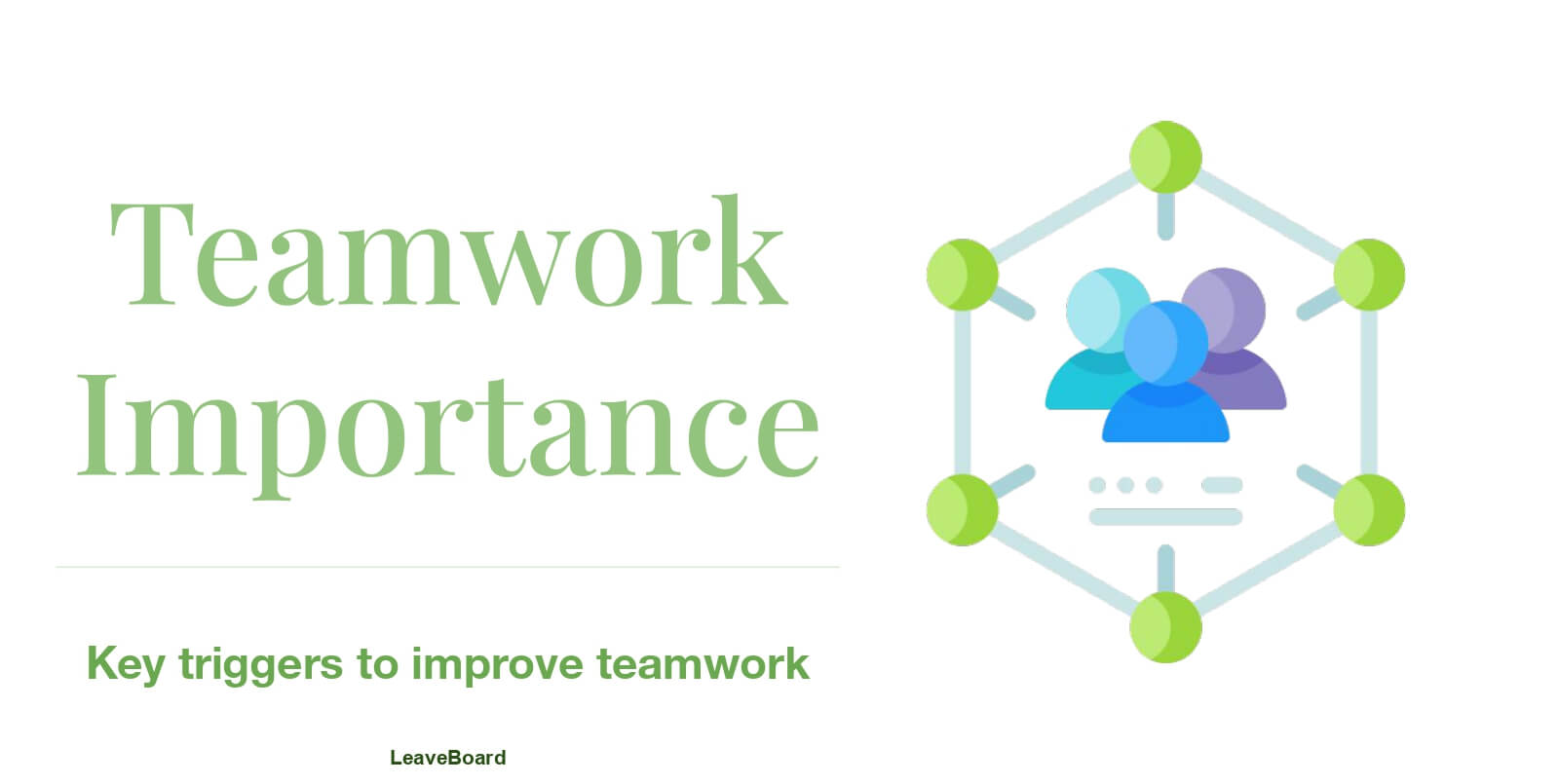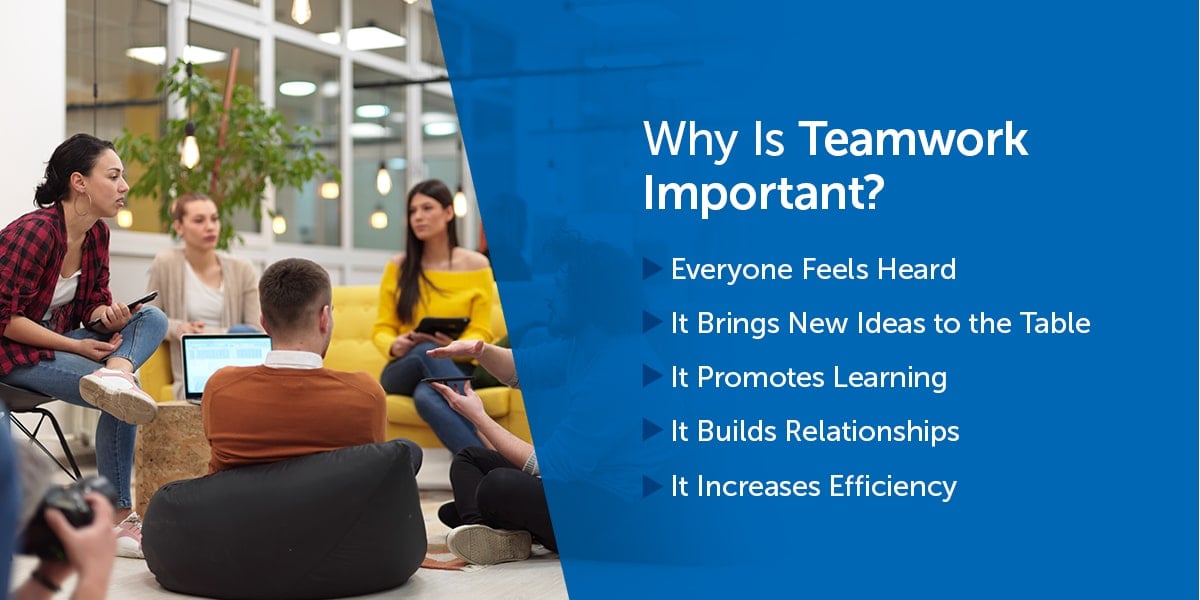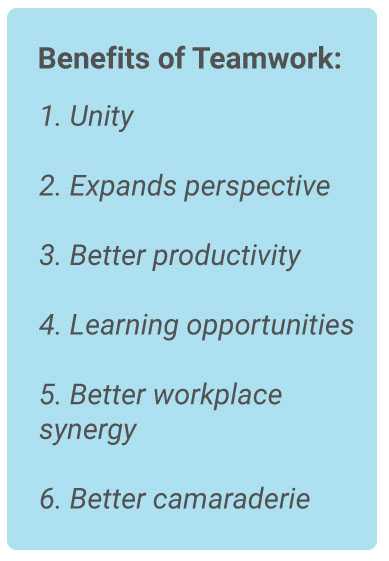Why Teamwork Is Important In The Workplace
Teamwork is important in the workplace because it fosters collaboration, improves efficiency, and enhances innovation and problem-solving abilities. In a team-oriented environment, employees are encouraged to share their diverse perspectives and skills, leading to more effective decision-making and higher productivity levels.
Teamwork also promotes a sense of collective ownership and responsibility, facilitating smoother workflow and reducing the burden on individuals. Moreover, team members can support and motivate one another, resulting in improved job satisfaction and higher employee engagement. By working together, teams can achieve greater outcomes and contribute to the overall success of the organization.
Improved Productivity
Teamwork plays a critical role in the workplace as it leads to improved productivity. When employees collaborate effectively and work together towards a common goal, they are able to achieve more and produce better results. Let’s explore two key factors that contribute to this improved productivity: increased efficiency and effective task delegation.
Increased Efficiency
By working as a team, employees can enhance their efficiency levels. They can pool their skills, knowledge, and experience to find innovative solutions and complete tasks more quickly. Team members can help one another by sharing their expertise and offering support and guidance, which helps eliminate bottlenecks and overcome challenges more efficiently. With increased efficiency, projects are completed faster, allowing organizations to meet deadlines, and ultimately improving overall productivity.
Effective Task Delegation
One of the key advantages of teamwork is the ability to delegate tasks effectively. Assigning specific responsibilities to team members based on their skillset and strengths ensures that each task is completed by an individual who is best suited for it. This leads to higher quality work as team members can focus on tasks they excel at, resulting in better outcomes. Moreover, effective task delegation helps prevent burnout and maintains a healthy work-life balance for employees, which further contributes to increased productivity.
To illustrate the importance of teamwork in the workplace, consider the following example:
| Without Teamwork | With Teamwork |
|---|---|
|
|
By embracing teamwork, organizations can effectively utilize their resources and harness the collective power of their employees. When teamwork becomes a part of the work culture, the result is improved productivity, as evidenced by increased efficiency through collaboration and effective task delegation. This, in turn, translates into better overall outcomes for the organization.
Enhanced Problem Solving
In today’s fast-paced workplace, problem-solving skills are crucial for success. When teams come together to tackle challenges, the collective wisdom and experience of diverse perspectives lead to enhanced problem-solving capabilities. The ability to approach problems from different angles and bring unique insights to the table can result in more creative and effective solutions. Let’s explore how teamwork promotes enhanced problem-solving and contributes to the overall success of organizations.
Diverse Perspectives
When working in a team, individuals bring their unique backgrounds, knowledge, and experiences to the table. Each member offers a fresh perspective on the problem at hand, raising new questions and providing alternative viewpoints. This diversity of perspectives allows for a more comprehensive understanding of the problem, enabling teams to explore a wider range of potential solutions.
Consider a scenario where a team is brainstorming ideas for a new marketing campaign. One team member might have expertise in social media marketing, while another might have experience with traditional advertising. Their contrasting perspectives can help the team consider all possible avenues and make better-informed decisions.
Collaborative Brainstorming
Teamwork encourages collaborative brainstorming sessions, where ideas flow freely and creativity flourishes. In such an environment, team members build upon each other’s thoughts, expanding and refining ideas as they go along. This collaborative process sparks innovation and enables teams to arrive at breakthrough solutions.
During a brainstorming session, individuals can bounce ideas off one another, building upon the initial thoughts and developing more comprehensive solutions. The synergy created by teamwork often leads to ideas that could not have been generated in isolation. Brainstorming sessions allow teams to tap into the collective intelligence of the group, increasing the likelihood of finding innovative solutions.
- Briefly explain the concept of enhanced problem-solving through teamwork.
- Introduce the first subheading, ‘Diverse Perspectives’, highlighting the importance of different viewpoints.
- Give an example of how diverse perspectives contribute to problem-solving in a marketing campaign scenario.
- Transition to the second subheading, ‘Collaborative Brainstorming’, emphasizing the benefits of collaborating with team members.
- Explain how collaborative brainstorming allows for the generation of more innovative ideas.
- Summarize the overall importance of teamwork in enhancing problem-solving capabilities in the workplace.
Boosted Innovation
Teamwork is essential for fostering boosted innovation in the workplace. By collaborating and pooling diverse perspectives, ideas, and skills, teams can solve complex problems, increase productivity, and drive creativity, leading to the overall growth and success of the organization.
Boosted Innovation In today’s fast-paced and competitive business environment, innovation is key to success. Companies that fail to innovate risk falling behind their competitors and losing relevance in the market. This is where teamwork plays a crucial role, especially when it comes to boosting innovation. Idea Generation When individuals work together as a team, a diverse range of ideas and perspectives are brought to the table. Each team member contributes their unique insights, knowledge, and experiences, resulting in a pool of ideas that is greater than what any individual could generate alone. These fresh and diverse ideas act as a catalyst for innovation, sparking creativity and pushing boundaries. Creativity Enhancement By working collaboratively, team members can bounce off each other’s ideas, building upon them and enhancing their creativity. The synergy that occurs within a team fosters an environment where new ideas can flourish and be refined. This collaborative creative process encourages individuals to think outside the box, challenge existing norms, and come up with unconventional solutions to problems. Additionally, working in a team provides opportunities for brainstorming sessions and idea-sharing exercises. These interactive sessions allow team members to feed off each other’s energy, sparking new connections and possibilities. Brainstorming enables everyone to feel included, fostering a sense of ownership and motivation. In this way, teamwork not only enhances the quantity of ideas generated but also improves their quality. Furthermore, teamwork offers a platform for constructive feedback and constructive criticism – crucial elements that drive innovation. When team members provide feedback on each other’s ideas, it promotes an iterative process where ideas are refined and improved. This constant back-and-forth exchange of ideas not only strengthens the final concept but also helps each team member grow and develop their creativity and problem-solving skills. In conclusion, teamwork plays a vital role in boosting innovation within the workplace. Through idea generation and creativity enhancement, collaboration among team members results in a greater volume of diverse ideas and the refinement of those ideas, ultimately leading to innovative solutions and a competitive edge in the market. Embracing teamwork in the workplace cultivates an environment that encourages innovation, fosters creativity, and propels companies forward.
Credit: www.risely.me
Positive Work Environment
A positive work environment is a crucial foundation for a successful team. It sets the tone for collaboration, communication, and productivity. When employees feel supported and appreciated, they are more motivated to contribute their best efforts. This, in turn, leads to better teamwork and overall success for the organization. Let’s explore how creating a positive work environment promotes a supportive culture and enhances employee engagement.
Supportive Culture
A supportive culture within a team fosters an atmosphere where individuals are encouraged to express their thoughts and ideas without fear. It establishes a sense of trust and psychological safety, allowing employees to take risks, learn from their mistakes, and grow both personally and professionally. This type of environment empowers team members to collaborate effectively, broadening their perspective and leveraging their diverse skills and experiences. It encourages open communication, constructive feedback, and mutual respect, strengthening the team’s cohesiveness and fostering innovation.
Better Employee Engagement
A positive work environment significantly correlates with increased employee engagement. Engaged employees are more likely to feel connected to their work, motivated to achieve their goals, and proactive in contributing their best to the team. They are committed to their organization’s mission and values, and this dedication translates into improved productivity and efficiency. When employees are engaged, they are more likely to support and uplift their colleagues, creating a culture of collaboration and shared success. This positive cycle of engagement boosts employee morale, reduces turnover, and ultimately leads to a stronger and more successful team.
Stronger Relationships
Teamwork is crucial in the workplace, fostering stronger relationships among employees. It promotes collaboration, communication, and trust, resulting in improved productivity and overall success.
Improved Communication:
Effective communication is the cornerstone of any successful team. When individuals collaborate and work together towards a common goal, communication becomes essential in ensuring everyone is on the same page. It enables team members to exchange ideas, share feedback, and clarify expectations. Improved communication leads to greater efficiency in decision-making and problem-solving, as everyone is aware of their role and responsibilities. It also helps in preventing misunderstandings and resolving conflicts amicably. Teams that prioritize communication are better equipped to overcome challenges and achieve success.Trust And Camaraderie:
Building trust and fostering camaraderie are vital ingredients for creating a cohesive team. When individuals trust and rely on their teammates, they feel more comfortable sharing responsibilities, ideas, and perspectives. Trusting relationships enhance collaboration, as team members feel supported and valued. This enables individuals to take risks, be creative, and think outside the box. Camaraderie, on the other hand, cultivates a positive work environment where individuals feel connected and invested in each other’s success. Teams that have a strong foundation of trust and camaraderie are more resilient and better equipped to navigate challenges and achieve goals. In conclusion, teamwork is crucial for cultivating stronger relationships within the workplace. Improved communication ensures that everyone is on the same page, facilitating efficient decision-making and conflict resolution. Trust and camaraderie foster a positive work environment where team members feel supported and connected, enabling them to collaborate effectively. By prioritizing teamwork, organizations can build stronger relationships among their employees, leading to increased productivity, innovation, and overall success.
Credit: leaveboard.com

Credit: individuals.neuroleadership.com
Frequently Asked Questions Of Why Teamwork Is Important In The Workplace
Why Is Teamwork Important In The Workplace?
Teamwork is important in the workplace because it fosters collaboration, improves communication, and maximizes productivity.
How Does Teamwork Benefit Employees?
Teamwork benefits employees by creating a supportive work environment, promoting skill development, and enhancing job satisfaction.
What Are The Advantages Of Teamwork For Companies?
The advantages of teamwork for companies include increased efficiency, creative problem-solving, and better decision-making, leading to overall business success.
Conclusion
The importance of teamwork in the workplace cannot be overstated. Collaboration and effective communication among team members lead to increased productivity, innovation, and overall success. By working together towards common goals, employees can pool their diverse skills and knowledge to tackle complex challenges.
This fosters a positive work environment and enhances employee satisfaction. Ultimately, teamwork cultivates a sense of unity and empowers individuals to achieve remarkable results. Embracing teamwork in the workplace is undoubtedly a recipe for triumph.




